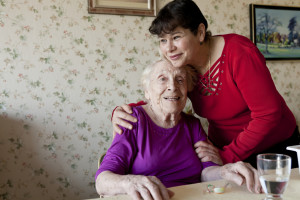 You’ve done the huge pile of laundry and ironing. You’ve made the bed and changed the linens for the second time today. You’ve done bath time, made dinner and run errands. It’s been a long day and you’re exhausted.
You’ve done the huge pile of laundry and ironing. You’ve made the bed and changed the linens for the second time today. You’ve done bath time, made dinner and run errands. It’s been a long day and you’re exhausted.
Although this may sound like a typical day in the life of a busy parent, it’s not. It’s a day that many grown children are experiencing right now as the primary in-home caregivers for their elderly parent(s).
As children, we are so used to our parents taking care of us that when it is time for the shoe to be on the other foot, so to speak, it can be completely overwhelming and stressful. To help you keep your head above water on the days when it’s all a bit much, unwind and regain your composure with meditation.
Meditation can:
- Increase patience in stressful situations and because your parent will feed off of your “frazzled” energy, helps to keep him or her calm and peaceful as well, creating a mutually beneficial positive care giving environment (click here to read some of the benefits of meditation for the elderly). A few deeps breaths can go a long way in diffusing a tense situation with your parent (i.e. him or her not wanting to take their required medicine).
- Help keep your entire body healthy by freeing the stresses that you hold onto both physically and mentally which, when not released, can cause you to become ill and fatigued.
- Allow you to be wholly present in the moment. For example, if you are caring for someone suffering from Alzheimer’s and that person is having a lucid moment and really enjoying your visit, mindfulness meditation can help you to fully immerse yourself in that moment rather than focusing on what happens next or wishing there were more of those particular moments. This time spent enjoying time each other’s company reminds you of the value in what you are doing. It also gives you something positive you can store in your memory banks for later.
- Provide (or renew) feelings of solace, faith, and security: Even when the parent you have known your whole life is changing right before your eyes in ways that can be hard to see, meditation can help to keep you grounded and give you strength to face those changes.
So on those busy days, how do you find time to incorporate meditation into your schedule as a caregiver?
Here are a few ways caregivers can add meditation to their day:
- Meditate together with your parent using a guided meditation when you have a few quiet moments of relaxation.
- Take advantage of any break you get (even if it’s while you wait for your parent at a doctor’s appointment) to practice mindfulness, perhaps doing some calming deep breathing.
- Make it a part of your day by “adding” it to your caregiver schedule – i.e. meditate when your parent is napping or when someone comes to relieve you for a break. Make that your cue that it is time for a few minutes of meditation, start with something short and sweet say 3 or 4 minutes of mindfulness. Soon it will become an enjoyable habit you look forward to for the peace it brings to your day.
Let meditation be something you do to take care of yourself so that in turn you can be the best caregiver for your parent. Practicing meditation as a means of self-care will go a long way in helping you to relieve stress, fight feelings of negativity, discouragement, frustration, or even depression. Allow meditation to be the break you take to feel better as you tackle your day.
To your inner strength – Anna

Dennet McFarlane says
I am a personal care aid for my job. I have taken care of my dad for two years after a heart attack, also while caregiving outside my home. Dad moved out back to Ohio and has gotten worse with his health. My mom and step dad both in their mid 70’s, and my sister 45 moved in with my family 9 months ago. I have 4 children 2are still home 1with cystic fibrosis. I’m finding it hard to try to help my dad via the phone from Virginia, take care of my mom and step dad, my son with c.f. and work as a caregiver outside my home. I feel guilty taking care of other people’s parents and not feeling like taking care of my parents when I get home. My sister 45 lost her only son 20 to herion and her world fell apart lost her home job and my mom and step dad were living with her because of their limited income. How can I effectively help all these people emotionally and financially and physically without breaking my marriage apart. Or losing my sanity?I read my bible and pray every morning. I feel guilty not being able to provide a home for my parents like some of the clients I have. Mymom and step dad are in a tiny room and stuff they do is getting on my nerves. My dad in Ohio is always in and out if the hospital, he won’t let caregivers in to help him he states he can’t afford it.My parents have a hard time paying rent and buying food and meds. They can’t afford a assisted living place. I’m frustrated. Any ideas?
Totally Meditation says
Hello Dennet,
I am impressed that you are still coping with all that is going on in your life! It sounds like you are under a huge amount of stress and need as much help as you can get. I am not a licensed therapist so I can not give that kind of advice, but one thing I can say is be kind to yourself. You are doing the best you can in an extremely difficult time. You are human and there are going to be times when things go wrong no matter how hard you try.
On a personal level there are a couple of things I do when I feel overwhelmed. The first thing I often do is create some space in my mind by practicing some mindfulness techniques to calm myself down so I can think more clearly. Prayer is also great for “letting go and letting God take over” When I am highly stressed out I may have to “let go” of the same things a few times and that is OK.
Another thing I do to help me gain perspective about what is going on in my life is I get a few sheets of paper and on the 1st one I write out all the things that are stressing me out and rate them as to how important they are (they are NOT all equally important). For bigger problems I break them down into smaller parts (so for example taking care of your mom and step dad might have a list like – making sure they have food, a safe place, someone to check in on them and so on). Then I rate those parts as to what is most important to handle first, second, third and so on. It helps me to see what is most important to do and work on those things first. If you have a trusted adviser, like a counselor you can talk to about this all the better. Sometimes another person can see more clearly what things can be safely dropped from the to do lists.
I wish you the absolute best of luck in finding ways to cope that keep your mind, body and soul intact. I also hope you find the people and resources you need to make your job more doable.
Connie